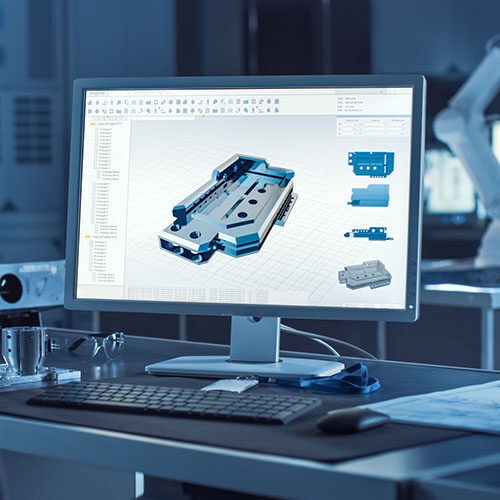
As we prepare to say good-bye to 2019 and usher in a new year (and new decade), it’s time to take a look at future trends that will influence the manufacturing world in 2020 and beyond.
A few months ago we looked at seven big trends in the manufacturing industry, and we believe that these will still hold for 2020.
One of these trends that is worth examining more, and in which we see more growth coming, is artificial intelligence (AI). But how exactly will AI impact ERPs?
What is Artificial Intelligence?
First, let’s take a look at what AI is and why this is a growing trend. AI can be defined simply as technology that simulates human intelligence. In real world terms this can mean things like machine learning or natural language processing, in which technology can learn from data, or learn to understand human voice commands. You are probably familiar with this technology on your smartphone, but how does it impact the manufacturing industry, and more specifically ERPs?
AI technology built directly into ERP systems can learn, and then help to automate routine processes, or create better user experiences by learning and adapting to users language, allowing systems to better understand and respond to users.
And while A.I. may still be in its infancy, Gartner predicts that in 2020 AI technologies will be in almost all new software products. Now, we don’t urge you to run out and invest heavily in AI technologies right this minute, but as it is a technology that is going to become ever more prevalent in the future, it’s a good idea for you to optimize your ERP system and data for the practical applications of AI now, so you will be able to take advantage of future opportunities as the technology matures.
How will AI impact ERP systems?
Manufacturers are looking to smart technologies and artificial intelligence to give them a competitive edge. Machine learning and intelligent manufacturing are already helping manufacturing companies to improve efficiency, for example in terms of quality checks and maintenance. Let’s look at three areas that AI will impact ERP systems.
Data Handling and Business Intelligence
Learning how to use and leverage your data to make better business decisions is one of the biggest advantages and ERP can give you—and can give you a major competitive edge.
Manufacturing is one of the most data-intensive industries out there, and an ERP, as it is connected to your entire operation, can spit out data about every facet of your manufacturing business. Using big data can help manufacturing companies address a lot of common problems that plague manufacturers—and can be used across your organization, not just at the C-Suite level. Having access to real-time data and customizable reports empowers decision makers throughout your organization to make faster and better decisions.
AI, through machine learning, can boost how your ERP handles and analyzes data as AI technology can analyze larger datasets than it was ever previously possible, meaning AI’s ability to work with massive amounts of data can enable better real-time, and accurate data insights. For example, AI can analyze the purchasing behavior of different categories of clients, enabling you to tailor your inventories directly to the needs of your customers—something that could be important to manufacturers.
In addition, artificial intelligence can also be used to read historical data and learn from earlier behavioral patterns. This could be extremely helpful to custom manufacturers in terms of creating quotes and estimates. Building new products poses a great challenge in creating quotes, but by deeply analyzing similar products you have built in the past, AI can give you greater insights to actual costs—making it easier to build an accurate quote for your customer (as well as help you to make better business decisions overall, by having a greater handle on job costs).
Process Automation
Automating business processes helps you to save both time and money.
When routine processes, like invoicing and month-end closing can take hours or even days to complete, you are wasting a lot of staff time and dollars. ERPs already immensely help manufacturers in this area and improve productivity—especially for those manufacturers who are still stuck in the world of Excel.
An ERP system can assist in scheduling, accounting, inventory management, and engineering, and can automate production processes, leaving your workforce to focus on other tasks such as the innovation that’s a key ingredient for business growth. Automating your business processes with an ERP lets you get more done with less, allowing you to take on more business with your current resources.
AI technology can boost your ERPs performance in terms of process automation. AI technology, with the ability to learn and make intelligent decisions, make routine responsibilities such as accounting and payroll administration as effortless as the click of a button. And, when integrated with an ERP system, AI can detect inefficient processes and suggest a solution that will cut costs, and improve efficiency. AI also allows for predictive diagnostics, minimizing the waste of resources.
User Experience
We’re not going to lie—learning to navigate a complex system like an ERP can be a major hurdle to some manufacturing businesses. ERPs, especially when you are learning a new system from scratch, are not always the most intuitive and simple software systems to use.
This is a big area where AI technology built into an ERP system can help. Just as AI technology can learn from you and make your smartphone easier to use, AI technology can also help with complex software systems like ERPs. AI technology improves user experience through interaction.
AI makes intelligent decisions based on human input, which in turn makes the application faster and more responsive and useful to the individual user. For example when searching through a data rich system like an ERP, AI can tailor search results based on a user’s history, bringing up more relevant information for the user—making the system faster and simpler to use.
And in terms of our first point, AI technology can easily handle both structured and unstructured data, and then give you a business analytics tool that organizes and presents data in a more clear and user-friendly way. Not only will the system give you better business analytics, it can also present that data in a way that is more relevant and easier to understand—boosting your ability to make better decisions.
———
While a major advantage of ERP systems is their ability to integrate your entire business, soon AI technology will be able to take this integration to the next level to help you become a more efficient and productive manufacturing business. As AI technology develops and matures, we are likely to see it start to become more prevalent in ERPs and the manufacturing industry.
Get your eBook Scared to implement a new ERP?
"*" indicates required fields



